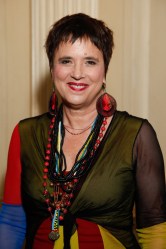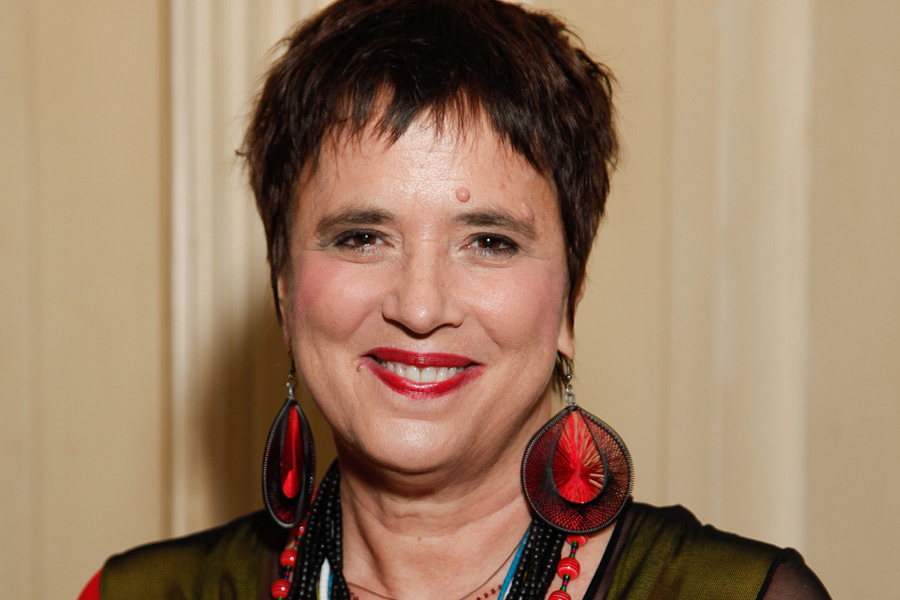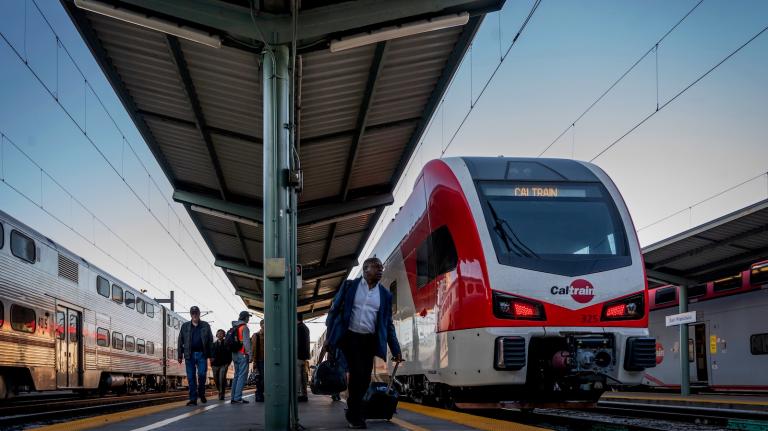
WeNewsEve Ensler wants you to speak up — and dance!
Eve Ensler made it OK to say the word vagina out loud. Could she now inspire more of us to say climate change too?
Ensler, the artist and activist behind The Vagina Monologues, is currently making a big push to promote One Billion Rising, a global event planned for this coming Valentine’s Day, aka V-Day. She’s calling for people everywhere to “dance, rise up, and demand an end to violence against women.” The campaign was inspired by a U.N. estimate that one in every three women will experience violence during her lifetime, meaning well over a billion of us.
And Ensler’s activism extends beyond this critical issue. She has recently been drawing connections between the violence that men perpetrate against women and the violence that fossil-fuel companies perpetrate against the climate and all of us who depend on it. She talked to Grist recently about how these topics tie together and her hopes for her new campaign.
—–
Q. I was interested to read a piece you published in The Guardian last month comparing climate change and violence against women. You wrote, “Like climate change, only the patriarchs with power seem to be blind to the magnitude of the horrors,” and you wrote about “the raping of the Earth through ecological destruction by the corporate powerful.” Can you talk more about those common threads?
A. It really occurred to me recently on a night where I went to a Bill McKibben event and I was listening to him talk about his 350 tour around the world, where he was seeing the impact of cutting off mountaintops and fracking and drilling. And I was thinking to myself, why does this feel so familiar? And I realized that I’m travelling around the world and I’m looking at the impact of violence against women and in each place it manifests itself differently — you know, you have honor killings, and you have gang rape, and you have sexual assault, and you have harassment, and you have female genital mutilation — but really, it’s the same fundamental idea. You’re destroying women and undermining women and raping women and disempowering women. He was talking about looking at the earth in the same way — there seems to be a pressing rape mentality, which has to do with the powerful getting what they want at the expense of the person they’re taking it from, without an awareness of reciprocity or mutuality. And that seems to be how we’re treating women, as well as how we’re treating the earth. It’s the same mindset.
Q. You work with a center in the Democratic Republic of the Congo for women who have experienced violence. Hundreds of thousands of women there have been brutally raped by armed gangs who are fighting over the country’s gold and diamonds. Again there do you see a connection between rape of women and rape of the land?
A. Absolutely. We’ve been working in the Congo for six years and we were able to build an incredible place with the women of Congo called the City of Joy. One of the things we’re seeing is the relationship — and I’ve seen this actually in my tour around the world this year, like in the Philippines, Peru, and everywhere — the connection between mining, for example, and violence against women. In the Congo it’s a very extreme version of this, which is really the way that corporations and the West and China and other places get their materials in the Congo — copper and gold and particularly coltan. They send in proxy militias who basically eviscerate communities — go into families, rape women, have husbands rape their daughters, have sons rape their mothers, they destroy the family structure — the community is fractured, splits apart, runs. They take the community that has the mine. So women’s bodies are now on the front lines, being raped and destroyed for the purposes of mining. When mines become militarized, where everything is militarized, escalation of rape and sexual violence occurs, but in the case of the Congo, this has been methodical, this has been intentional and systematic.
Q. What kind of policy changes do we need to help end violence against women?
A. Right now I’m obsessed with sexual education. We need to teach children young what their bodies are, what violence is, what love is, what touch is, what sexuality is. Most boys that I’ve interviewed across the planet have learned about sexuality from pornography. It’s true with girls too. That’s the first time they ever see it. So we’re not bringing people up to understand that sex is mutual, that it has to do with pleasuring each other, that it has to do with touch, that it has to do with openings. We’re bringing boys up who don’t even understand that they’re being violent when they’re being violent, because it’s become so ordinary. So I would love to see sex education be universal and something that we really develop at a young age, because I think that everything gets determined then.
And then, obviously, accountability and enforceability of laws. We have so many good laws in so many places, but there’s no certainty of justice anywhere. Part of it is that patriarchy doesn’t have the will. How do we change that?
Q. One Billion Rising calls for people all over the world to dance. What’s the significance and power of dancing?
A. Dance is one of the most powerful things that we can do. The women of Congo have really taught me, because they’ve suffered the worst atrocities on this planet, and yet their capacity to dance and transform their pain into power is remarkable. One of the things I feel about women is that we live in a cage, but the cage is so normalized that we don’t even know it anymore. We think about what we wear anytime we go someplace because if we dress wrongly we could be attacked; we think about where we go, what time it is, how we move, whether we’re being too provocative. And this has become our cage. We live in fear, under constant threat and intimidation. I think dancing breaks the walls of the cage, it expands the boundaries, it says: I’m here, I’m free, I’m me, I’m authentic, I’m in my body, I’m calling up my life force, I’m calling up all of me. And I think it’s contagious, it’s done in community. Corporations can’t control it; it’s holy, it’s sexual, and it’s a way of being very powerful and a little dangerous without being violent.
The women of Congo, at City of Joy, they dance all day long. It’s part of their therapy. And when I’m there, I just dance the whole time. And when I come back, I’m so happy. Because it’s the world we should living in.
I hope that everybody tells everyone they know to rise and let One Billion Rising be the beginning of the opening of the new world. Feb. 14 is not the endpoint, it’s the new beginning, you know?
—–
One Billion Rising gatherings will be happening all around the world — find one, or plan your own dance-dance-revolution.




